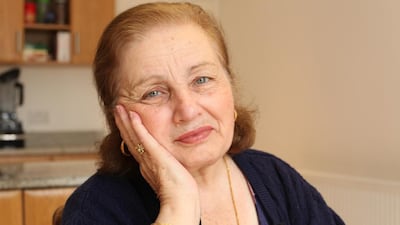They say you should start in the kitchen when interviewing a chef, and the first thing I notice about Salma Hage is how busy her South London home is. Family is important to her: the recipes she creates are tried and tested on her son and grandson; and agreeable, well-fed guinea pigs who regularly pop by to see what’s cooking, a routine that has seen the whole family on unfamiliar ground in recent years.
“They push me to try new things every week and that keeps me interested,” she says. “They’ve become passionate vegetarians, so I’ve started to revisit the recipes I used to cook as a child.”
For all Lebanon's nose-to-tail dining heritage (minced kibbeh, chicken liver, bone marrow, knuckle-thick skewers of meat in all its forms), Hage displays a remarkable ambivalence to anything with a pulse in her new collection of recipes, The Middle Eastern Vegetarian Cookbook.
It shies away from beef, mutton, poultry and the rest, and puts vegetables and grains front and centre. Given time, it could do for the unfashionable lentil what Henry Ford did for the motor car.
Hage says her own diet is increasingly meat-free, and together with her upbringing in the mountains of northern Lebanon, it’s a surprise she didn’t get around to writing her new cookbook sooner.
“It’s largely how I ate as a child,” she says. “We had the most amazing climate that was ideal for growing delicious fruit and vegetables. Meat was something we could rarely afford.”
Such an upbringing makes you obliged to consider the 73-year-old grandmother’s foodie lineage. Growing up in Mazraat Al Toufah, a village in the hinterlands outside Tripoli, Hage first learnt to cook by instinct. The eldest of 12 children, she found her way into the kitchen at the age of 9, learning how to tease flavours from succulent figs, juicy dates, and rose-pink pomegranates, all while being guided by her grandmother.
One of the first dishes, she says, was mjuderah, a casserole of cooked lentils, rice and crispy fried onions. “That was where my love of cooking began,” she says.
“It was a very small village and cooking was a communal activity: it brought people together.”
Success may have been a lifetime in waiting for Hage, but it still takes an enormous amount of hard work to make it seem this effortless. As part of a generation that grew up in the kitchen – quickly emptied pots of aromatic-spiced stews and casseroles were her measure of success – she has handcrafted more than 650 recipes, the bulk of which made up her butcher slab-thick bestselling debut, The Lebanese Kitchen, released four years ago.
“I never imagined it would sell so many copies,” she says, adding she is still surprised when people stop her to sign a copy. “One lady approached me while I was in a bookshop in Chicago. She told me she had a grandmother called Salma who was from the same village as me. At first she thought we were related, but it turned out she was talking about my father’s aunt, the woman I was named after.”
Unusually in an age of social media trends and Instagram shares, the wider public knows very little about her. While she has spent decades working as a housewife and family cook, much more interesting for food connoisseurs is how she found her way into the company of legendary French Michelin-star chef Alain Ducasse, now a close friend.
“Our upbringings were remarkably similar, despite having grown up so far apart,” she says. “He also has a great interest in vegetarian food, which is almost unheard of for French chefs.”
The author also shares a sensibility with Lebanon’s TV celebrity chef Ramzi, believing her home cuisine is now untouchable. Lebanese cuisine, she believes, has overtaken Chinese and French food in popularity and influence, primarily because of its versatility. “It lends itself to healthy eating,” she adds. “And that’s important to people today.”
Such passion lends a real sense of character to The Middle Eastern Vegetarian Cookbook, and it's evident Hage cooks from fond memories. Everywhere, there are hints of her childhood in Lebanon and family gatherings in her kitchen in London. Be it walnut and pistachio maamoul cookies, or delicious meat-free kibbeh, made with lentils, bulghur wheat, potatoes, coriander, parsley and seven-spice seasoning.
“The cookies are impossible to resist.” she says, “especially with traditional Arabic coffee spiced with cardamom. I think that truly represents the Lebanese way of eating. Yes, it’s about socialising, but it’s also about friends and family.”
artslife@thenational.ae

